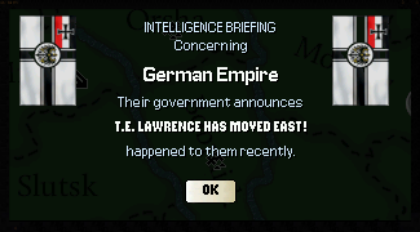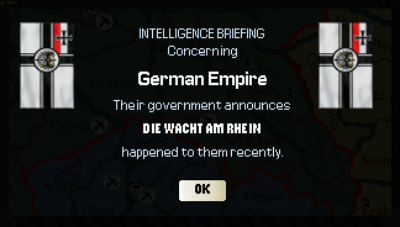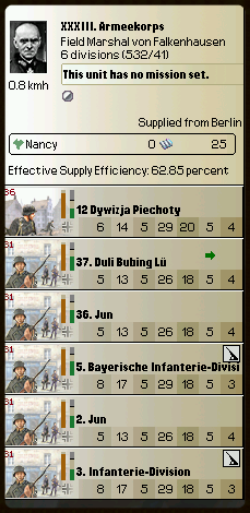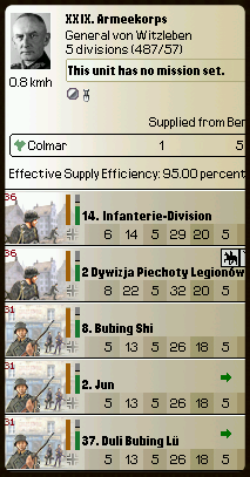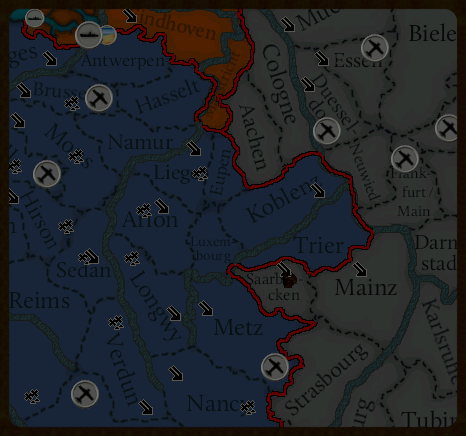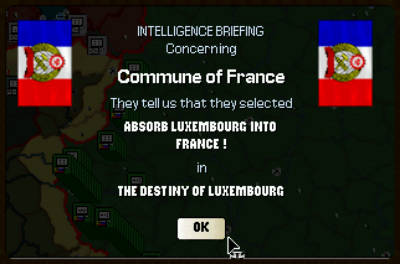Chapter 124: A Crisis Viewed from Afar.
Imperial Council,
Sankt Petersburg
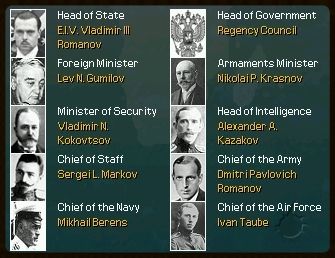
The Imperial council was charged with energetic argument as suggestions fired back and forth across the room. The news of the sudden shift in Europe had caught everyone off guard. A week ago most of the talk among the upper echelons of power had regarded rumours of the Emperor’s new dancer or the next phase of his intensive overhaul of Russia’s education system. Now things had changed, markedly, and Marshal Markov up a hand in a sign of objection.
“The army is not prepared to countenance any such intervention. We’ve just released large numbers of men for leave, they’re scattered as far abroad as Siberia. We’ve begun a grand reorganisation of just about every combat unit and half the air-force is grounded for overhaul maintenance after intensive tropical service. It will be months before we’re in a position to embark on another limited conflict, let alone a general campaign to aid the Germans in Europe.”
The young and fiery Minister Gumilev didn’t passively accept the rebuke.
“With respect Marshall, Is it truly your opinion that our strategic situation would be improved by a red block extending from San Francisco to Warsaw?”
Markov stood his ground.
“With respect Minister, such a situation is far from imminent, and the army is simply not in the position to conduct such a campaign even if it were.”
“Your forces have just performed miracles Marshall, the citizens of Jerusalem and Constantinople would proudly attest to that fact.”
Markov matched the praise with a sour, sarcastic tone.
“The forces of the French Commune also appear to be in the business of miracles Minister, as the better part of a million German and Polish prisoners would no doubt attest.”
“None the less Marshal, with Austria announcing partial mobilisation, we clearly have an opportunity.” The rest of the council elected to hold back, watching the young Minister attempt to outmanoeuvre the world’s pre-eminent expert on manoeuvre warfare.
“I was of the understanding that your department suggested that the Austrian mobilisation was a purely defensive response to the presence of half the red Italian army on their border, as well as the sudden developments in Germany. The formation of a volunteer legion is clearly an attempt to aid Germany without triggering an entry into the war. And if they haven’t entered yet, one can hardly expect them to do so later.”
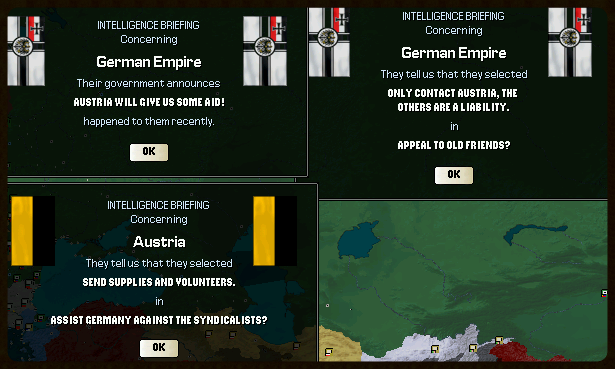
Lev decided to make one last pass, not yet willing to give up his call for an immediate military response to the red victories in Europe
“My report, Marshall, also made clear that the Austrian position may change if we enter the war and are able to score clear victories in the field.”
Enough thought Vladimir.
“I had a meeting with the Japanese Foreign Minister.” Vladimir kept his tone neutral as he changed the subject, not wanting to contaminate the first reactions of his council with any signals in his voice.
“Minister Yoshida was extremely gracious and expressed Japan’s deep empathy with our concern over the recent developments in Europe. He expressed his belief that there is a danger that Germany may well fall to Syndicalism, particularly given that both the Internationale and Entente are arrayed against it. As such, he announced that his Government is prepared to accelerate our technical exchange program, and that the Japanese military will commence an immediate partial mobilisation, in case their region requires stabilisation in the near future."
Ivan Taube, commander of Russia’s Imperial Air Force nodded firmly in affirmation
“Your Majesty demonstrated great foresight in establishing Japan as an ally. I must admit the Air Force has been surprised by the extent of Japanese cooperation to date, they have been remarkably faithful as allies.”
Markov considered rescuing his subordinate from the mire he had just dug himself into. Instead, he waited for Dimitri Pavlovich to drop the axe. After a few seconds of silence, Russia’s President did exactly that.
Staring directly at Kokovtsov, the elderly Security Minister that had served through the Russo Japanese war, more than three decades before.
“Threat?” enquired Dimitri bluntly.
“A threat, albeit a kind one” replied Kokovtsov, offering a minor nod in agreement.
Taube just looked confused but was reluctant to follow up without a signal from Markov, he held his tongue and waited for the sudden rebuttal to be explained. Markov hurried the process along, posing a direct question to the head of Imperial Intelligence, Alexander Kazakov.
“What does our intelligence say on the matter?”
Kazakov, as was his way, leafed through a number of documents as he responded, checking details as he went.
“The populations is generally supportive, and prepared for a war. From what we understand, the Japanese will probably be enacting what we’ve termed mobilisation plan J3, they’ve given it a rather more oriental code name which I shan’t attempt to pronounce. That means a general preparation for expeditionary warfare in the East Asian and Pacific region, without the activation of their home defence units or many of their more disruptive wartime practices. ”
“With their intentions being?”
“Japan’s intention has always been the extension of its Empire in Asia, particularly through the assimilation of German colonies in the region, J3 seems the likely prelude to that. I imagine that is what they are intending to do as soon as they are confident German power in Europe collapses.”
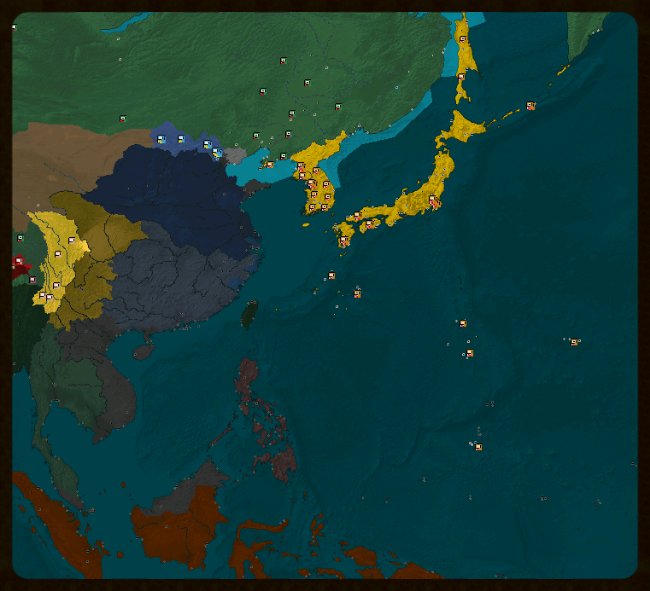
Dimitri let a dark timbre sneak into his voice, a reflection of his coldly admiring appraisal of the Japanese diplomatic move.
“Every Japanese war plan we’ve been able to compromise suggests that the seizure of German colonies in Asia is a necessity for Japan’s long term military and economic security. Were we to ally with Germany, they would instead find themselves defending those colonies for no possible gain on their part. I imagine the military there would push for a diplomatic adjustment, followed by aggressive military action.”
“Meaning?“ Pressed Dimitri, already knowing where his own instincts lead him on the matter.
“I have little in the way of human intelligence to confirm it, but from the technical sources, I’d suggest an alignment towards Chicago as the only potential alternative economic partner, followed by a rapid seizure of all German territories in the Asia-Pacific. If they estimate that any alliance with Germany would require we resist on behalf of Berlin, they may also chose to undertake pre-emptive action against our ability to project power in the region.”
“Which” confirmed Admiral Berrens
“is, thanks to our treaties, more or less limited to a small combined arms station in Vladivostok. They could scuttle our fleet in harbour and be well along the trans-Siberian before we could appropriately respond.”
“It worked” mused Kokotsov,
“well enough the last time they did so.”
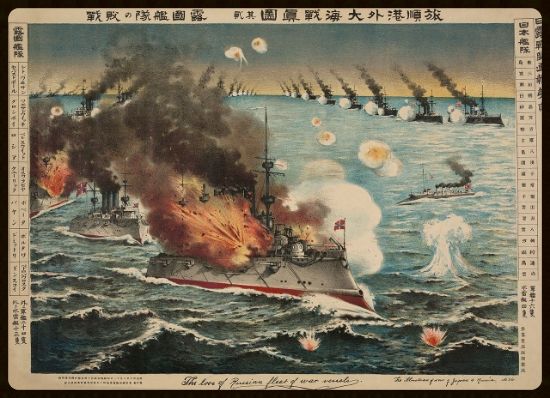
Taube looked outraged and about to unleash a number of unfavourable words towards the Japanese he had described only a minute earlier as honourable. Fortunately for the tenor of the meeting, the Emperor chose that moment to weigh in.
“The Japanese are fine allies.” He stated it calmly, seeking to take the edge off the dark and jaded tone Dimitri had introduced into the meeting.
“They have traded fairly, allowed us an exceptionally free hand in Asia and supported us diplomatically and technically in campaigns in regions that are truly of no interest to them. I understand a number of Japanese observers and aircraft participated in our push to Jerusalem. I find it hard to fault their conduct thus far.” He brought both of his hands together in consideration.
“They know that they are facing down Chicago on our behalf, and that threat is only going to grow with time. I’m also convinced that they see the threat from Syndicalism.”
Vladimir took a moment, seeking to demonstrate confidence by his relaxed speaking pace, a far cry from the brutal lightening debates he had enjoyed at university.
“However they suffered a bad turn of fate, at the hands of the Manchurians, the Koreans, the Formosans and Kolchak. They are determined to regain some of what they have lost and improve their economic position. They have always believed that our alliance would eventually deliver them the German colonies. So long as they continue to believe that, they will be the best of allies.”
“If, however, that ceases to be the case, I fully expect that they will proceed in much the way that our chief of Intelligence suggests. That would leave us with our Eastern flank horribly exposed, not just to Japan but to Chicago as well as soon as they complete their conquest of the Continental United States. Even if we move troops and air-assets, we lack the fleet that would be required to effectively defend our Pacific theatre. I would also note that, technically, an alliance with Germany would mean war with Canada and the Entente, something which I will not countenance.”
Markov spoke up as the Emperor ceased his speech once more.
“It should be remembered your Majesty, that as much as I do not believe out intervention could prevent the fall of Germany to Syndicalism, it is possible. I am all but certain however, that without our intervention, and with the Austrians unwilling to enter the war, Germany will fall.”
“I hope, Marshall, that the Winter and German steel will hold the reds, at least for a while. Given our diplomatic situation with Japan and the Entente however, I see no alternative but to supply the Germans as best we can and prepare for the worst.”
There was an uncomfortable silence in the room that dragged on for what seemed like an eternity. The priceless grand-father clock marked each second with a gentle but precise tick. Germany may have been the enemy of the first war, they had torn Russia apart and insisted on harsh reparations…but there were limits to those things one would wish, even upon ones enemies.
Dimitri found his voice, distaste for the situation hanging on his every word like a toxin.
“I understand, as much as anyone here, those crimes that Germany committed during the first war. They fell upon Russia like vultures. But no matter how much they demanded, they never let us fall to the reds, and I remain convinced that we would not have achieved what we did in 36 or 37 without German aid.
No people, whatever their past crimes, deserve to be abandoned completely to the likes of Valois’ and his Sorelians.”
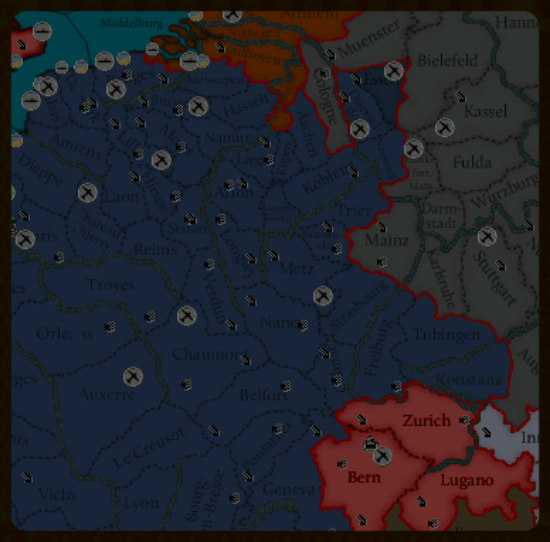
The room was silent again, deep emotions were held back as all waited for the Emperor’s response. It was whispered among some circles that Dimitri remained, to this day, among those politicians that regarded Germany as Russia’s most natural ally. Such an opinion seemed to make sense, given that the German alliance had been the linchpin of his Government’s foreign and reform policies. A quiet, ongoing tension existed between those that regretted the end of the German alliance, and those that supported the more independent and aggressive foreign policy that had defined the last months of Cyril’s rule and the entirety of Vladimir’s reign.
Of course those conflicts could only be proven to exist as whispered rumours, for the most part every sign pointed to Dimitri Pavlovich Romanov and Czar Vladimir as being an inseparable and seemingly infallible team at the head of the resurgent Russian Empire.
And yet, for a moment in time, the inner circle of Imperial Government watched as Russia’s two most powerful men appraised one other.
Vladimir placed a palm on the table….and nodded.
“I tend to agree Dimitri. And it’s not just Germany, Poland is at stake as well.”
The tension in the room evaporated.
“Marshal Markov” called Vladimir.
“Your Majesty!” declared his Marshall, letting a little too much of his relief at the maintenance of unity between the Emperor and the President creep into his response.
“I understand that time is short, but with any luck, the German army and the winter will buy what time we need. I know we have discussed Case Plan Michael in the past. I want a timeline on its possible execution. Every asset required will be released to you and every preparation you deem necessary to that end is hereby authorised. An alliance with Germany may be out of the question, but that does not mean that we should not save what we can come Spring.”
The Emperor rose in from his seat, signalling the rest of the council to do the same.
The meeting was over, months worth of preparations would remain, but Russia’s next course of action was now decided.


